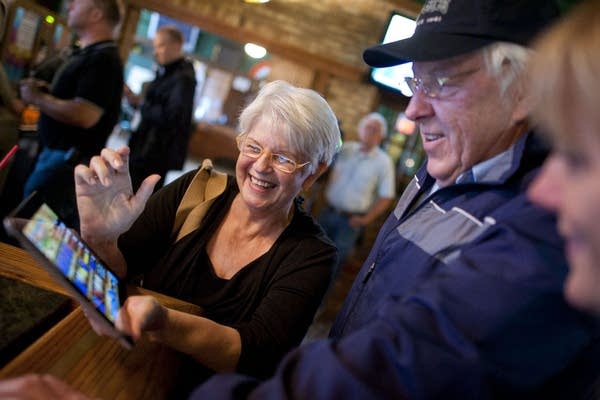Vikings stadium pull-tab revenue reportedly lags
Go Deeper.
Create an account or log in to save stories.
Like this?
Thanks for liking this story! We have added it to a list of your favorite stories.

Proceeds from expanded gambling are not filling up the state's account to help pay for a new Vikings stadium as quickly as had been hoped, finance experts say.
It's no secret Minnesotans like to gamble. The state's charitable pull-tab industry is the biggest in the country, with about a billion dollars bet a year.
But the market for gaming in the state may have reached a new limit.
The Minnesota office of Management and Budget offered the first hint of that today, when it scaled back the size of the account set up to pay the state's stadium bills. Finance experts pared the balance from $34 million to $16 million for the 2013 fiscal year because revenue from new pull-tab games is weaker than expected. That's how the state intends to fund its $350 million contribution to a new billion-dollar stadium in Minneapolis.
Turn Up Your Support
MPR News helps you turn down the noise and build shared understanding. Turn up your support for this public resource and keep trusted journalism accessible to all.
"The pull tab revenue is down because we don't have as many sites up as previously expected," said Jim Schowalter, state budget commissioner.
It's hard to know exactly what to expect, partly because pull-tabs have been legal in Minnesota for only 78 days. They started Sept. 18, and as of Tuesday night, gamblers had bet $2,890,000 on the machines, according to data from the Minnesota Gambling Control Board.

Schowalter said he expects pull-tab revenue to grow.
"We do see more vendors getting under review, and we expect a lot more sites to go up, but we had expected many more bars to be running pull-tabs than we have," Schowalter said.
Initial projections were based on 15,400 electronic pull-tab machines in operation, supplemented with nearly 7,000 more electronic bingo games. As of Tuesday, there are 336 electronic pull-tab machines in operation -- about 2 percent of the initial projection, although no one expected that all the machines would come online right away.
Electronic bingo still has not started.

And that isn't the only disappointment. The pull-tab machines were expected to take in about $225 of bets daily, on average. As of Tuesday, each machine pulls in an average of $199 a day, about 12 percent below initial projections, according to data from the Minnesota Gambling Control Board.
If the trend continues taxpayers could be on the hook for the debt payments on the new stadium, set to break ground next year, although the stadium bill includes a backup financing plan.
But experts say neither of those problems are necessarily alarming, even as Minnesota prepares to put up a third of a billion dollars to pay for the new football stadium.
Al Lund, executive director of Allied Charities of Minnesota, the trade group that represents charitable gambling operators, said a monopoly on the market by a single distributor, Minneapolis based Express Games, is holding back adoption of electronics as operators take a wait-and-see approach.
"Many of our members have said, we dealt with this person who is our distributor today for 20 years, we'd probably like to wait and see what they're going to bring, and we believe we'd have thought we'd have other choices at this point," Lund said.
More suppliers are in the pipeline, Minnesota Gambling Control Board executive director Tom Barrett said today.
"The rest of the vendors — and we're tracking progress on four right now — are in different stages of the background checks, the game design," Barrett said. "I'm hopeful that come our meeting in December, we'll have two vendors for sure approved for licensing."
Barrett also cautioned that the board cannot skimp on oversight for the sake of expedience.
The sales projections shortfall might be a different problem, like an expression of Minnesotans' relative interest and not just bureaucratic difficulties that may fade with time.
The inventor of the games being used in bars now, Las Vegas-based entrepreneur John Acres, said he thinks the numbers will come up as people become more familiar with the games.
"We did one survey here recently where we found that most players in some locations didn't even know they had electronic pull-tabs," Acres said. "It does make it hard when they don't even know it's there to purchase."
Acres said he thinks the games will soon do what many other online applications have done already — go social among Minnesotans and their friends, and start making money.




